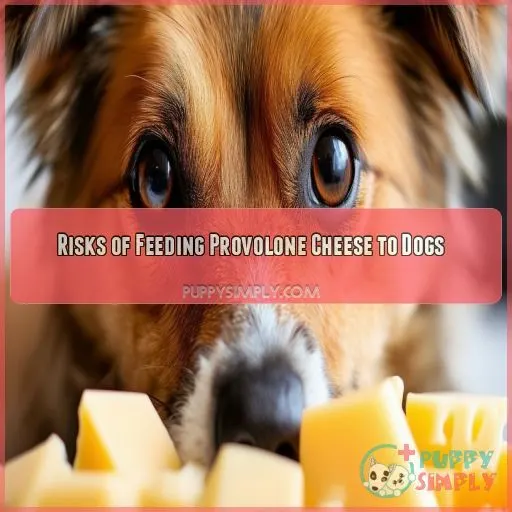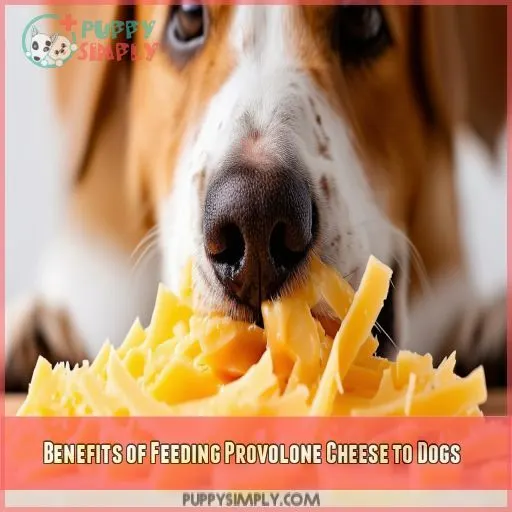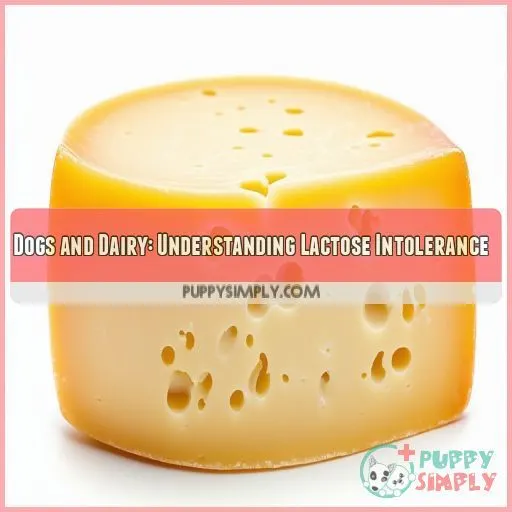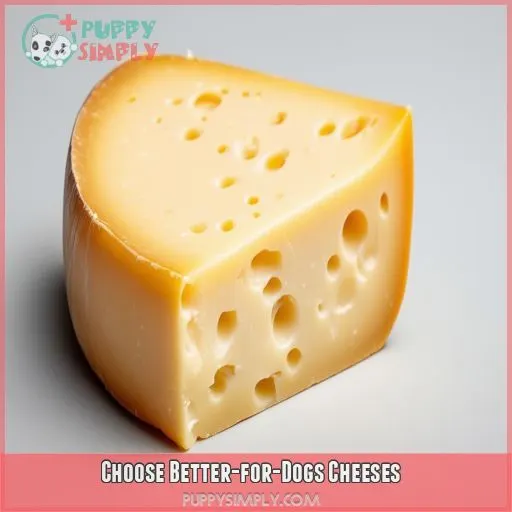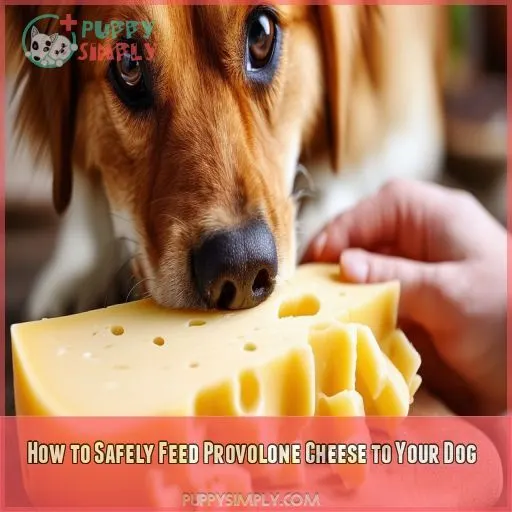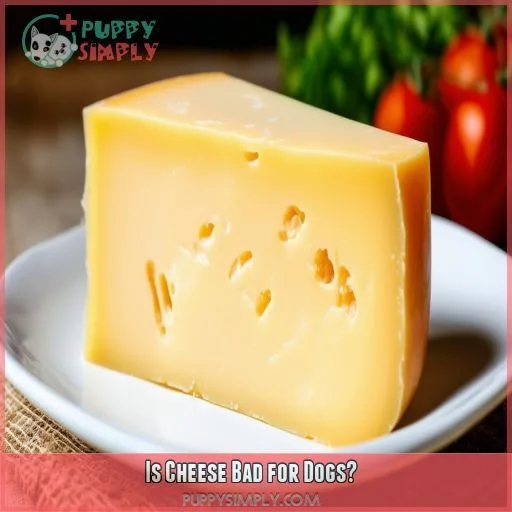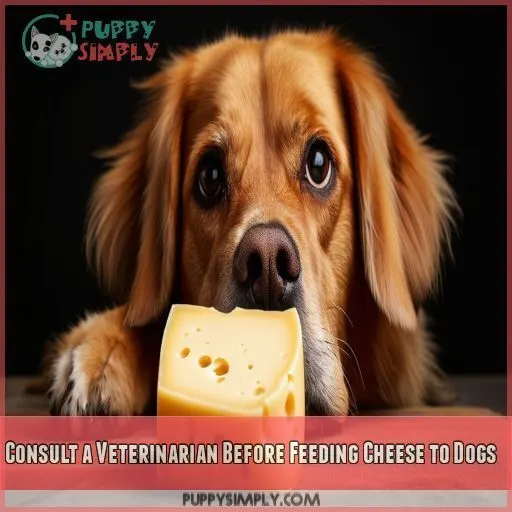This site is supported by our readers. We may earn a commission, at no cost to you, if you purchase through links.
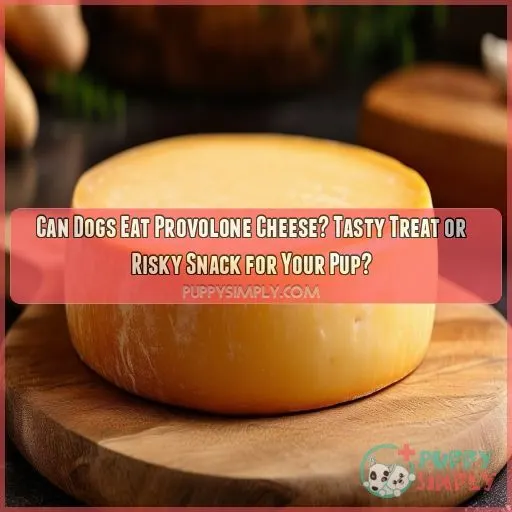 Like any concerned pet owner, you are probably thinking of knowing whether or not it is safe for your four-legged companion to have provolone cheese.
Like any concerned pet owner, you are probably thinking of knowing whether or not it is safe for your four-legged companion to have provolone cheese.
While provolone does have its associated health benefits, the risks involved and proper guidelines when feeding demand full awareness to keep your pup healthy and well.
This article will cover topics about the pros and cons of feeding provolone cheese to dogs so that you are better placed to make informed decisions about what to feed your canine friend.
Table Of Contents
- Key Takeaways
- Can Dogs Eat Provolone Cheese?
- Risks of Feeding Provolone Cheese to Dogs
- Benefits of Feeding Provolone Cheese to Dogs
- Dogs and Dairy: Understanding Lactose Intolerance
- Choose Better-for-Dogs Cheeses
- How to Safely Feed Provolone Cheese to Your Dog
- Is Cheese Bad for Dogs?
- Can Specific Breeds Eat Provolone Cheese?
- Consult a Veterinarian Before Feeding Cheese to Dogs
- Frequently Asked Questions (FAQs)
- Is it okay for dogs to eat provolone cheese?
- What cheese dogs Cannot eat?
- Can Shih Tzu eat provolone cheese?
- Can cheese upset a dog’s stomach?
- Can cheese help with dog training?
- How to use cheese to conceal pills?
- Should cheese be mixed with dog food?
- What are symptoms of pancreatitis in dogs?
- Can cheese help decrease dog’s cholesterol?
- Conclusion
Key Takeaways
- Remember, cheese is like a delicious treat your pup can’t resist, but don’t let them overdo it!
- If your furry friend’s tummy is sensitive, cheese might not be the best option.
- Think of cheese as a tasty training tool, but don’t let it become a daily habit.
- Keep an eye on your pup after they’ve had some cheese, just in case they’re not a fan of the cheesy goodness.
Can Dogs Eat Provolone Cheese?
You’re probably wondering if it’s safe to share that tasty provolone with your furry friend. Well, the short answer is yes, dogs can eat provolone cheese, but with some important caveats.
As a dairy product, provolone isn’t toxic to dogs, but it’s not exactly a health food either. It’s high in fat and calories, so you’ll want to be mindful of portion sizes. Think of it as an occasional treat rather than a dietary staple.
When considering provolone cheese feeding guidelines, remember that moderation is key. If you’re looking for provolone cheese alternatives or substitutes, there are healthier options out there.
Always store provolone cheese properly to avoid spoilage. While it’s not inherently dangerous, there are some provolone cheese health risks to be aware of.
Let’s dig deeper into what you need to know.
Risks of Feeding Provolone Cheese to Dogs
Feeding your dog provolone cheese comes with two main risks: its high fat content and potential Lactose intolerance. While most dogs can handle small amounts of cheese, the high fat in provolone may lead to weight gain or pancreatitis, and some dogs may experience digestive issues due to lactose sensitivity.
High Fat Content
You might be tempted to share your provolone with your pup, but be cautious. The high fat content in this cheese can pose risks:
- Pancreatitis risk increases
- Digestive issues may arise
- Weight gain can occur
- Sodium content is often high
While provolone offers calcium and can be a tasty training reward, its saturated fats are concerning. Consider lower-fat alternatives like goat cheese or cottage cheese for your dog’s occasional treat. Always monitor for any adverse reactions.
Lactose Intolerance
While high fat content is a concern, lactose intolerance is another risk when feeding provolone cheese to dogs. Some pups can’t digest lactose properly, leading to digestive issues. Here’s a breakdown of lactose intolerance in dogs:
| Symptom | Severity | Duration |
|---|---|---|
| Gas | Mild-Moderate | 1-2 days |
| Diarrhea | Moderate-Severe | 2-3 days |
| Vomiting | Severe | 1-2 days |
| Stomach upset | Mild-Severe | 1-3 days |
If your dog shows these signs after eating cheese, consult your vet.
Benefits of Feeding Provolone Cheese to Dogs
Feeding provolone cheese to your dog can provide them with high-quality protein, calcium, essential fatty acids, and B-complex vitamins. These nutrients support your dog’s overall health, but it’s important to offer cheese in moderation and monitor for any adverse reactions.
Protein Content
Provolone cheese offers a rich protein source, supporting your dog’s muscle maintenance and overall health. Benefits include:
- High-quality milk protein
- Efficient protein absorption
- Essential amino acids for growth
Calcium Source
Provolone cheese is a great source of calcium for your pup, supporting strong bones and healthy teeth. The calcium in provolone can help prevent osteoporosis and improve dental hygiene.
| Calcium Benefits | Provolone Cheese | Other Dairy |
|---|---|---|
| Bone Health | ✓ | ✓ |
| Dental Health | ✓ | ✓ |
| Osteoporosis Prevention | ✓ | ✓ |
Essential Fatty Acids
Provolone cheese contains essential fatty acids that support your dog’s skin and coat health. Including these acids in your pup’s diet aids in reducing inflammation and promoting overall well-being.
B-Complex Vitamins
Provolone cheese contains B-complex vitamins, essential for your dog’s health. These vitamins support metabolism, energy production, and enzyme function. Ensure moderation and monitor for lactose intolerance or digestive issues.
Dogs and Dairy: Understanding Lactose Intolerance
As you learned, cheese can provide valuable nutrients for your canine companion. However, not all dogs digest dairy products well. Just like humans, some pups may be lactose intolerant. This means their bodies struggle to break down the natural sugars found in milk and cheese.
Feeding lactose-heavy foods can lead to unpleasant gastrointestinal issues like vomiting and diarrhea. The good news is that softer, lower-lactose cheeses like cottage or goat cheese may be better tolerated. Pay close attention to your dog’s reaction when introducing any new dairy treat.
If you notice signs of distress, discontinue feeding and consult your veterinarian. With some trial and error, you can find the right cheese that your pup can enjoy safely.
Choose Better-for-Dogs Cheeses
When choosing which cheese to feed your dog, low-fat variations like mozzarella or cottage cheese are good. Don’t give cheeses with additives in them. Monitor at all times the amount of sodium being consumed for optimal health and well-being in your pet.
Low-Fat Cheese Options
When considering low-fat cheese options for your dog, opt for those that are healthier and low-sodium:
- Mozzarella
- Cottage cheese
- Soft goat cheese
- Swiss cheese
These varieties offer better alternatives, ensuring safe serving sizes and reduced lactose content.
Cheese Without Additives
When choosing cheese for your dog, opt for varieties without added flavors, preservatives, or other ingredients. Stick to plain, low-fat cheeses like mozzarella or cottage cheese to minimize risks from sodium, lactose intolerance, and potential toxins for certain dog breeds.
Monitor Sodium Intake
High Sodium levels can lead to high blood pressure, kidney disease, dehydration, and salt poisoning in dogs. When choosing better-for-dogs cheeses:
- Select low-sodium options.
- Avoid processed cheeses.
- Offer cheese in moderation.
- Consult your vet for advice.
How to Safely Feed Provolone Cheese to Your Dog
To Feed your dog provolone cheese safely, consider its portion and ingredient quality, along with the risk of pancreatitis. Observe your dog’s reaction in case of its first try of cheese.
- Small portions: Give small bits so as not to overload their digestive system.
- Plain cheese: Make sure it doesn’t have any added flavors into the cheese, especially any of the bad ones like Garlic or Onion.
- Observe for reactions: Monitor the patient for diarrhea or other gastrointestinal complaints, or any vomiting.
- Consider age and health: Older dogs and those with a compromised health condition, such as increased blood lipids or decreased digestive enzyme activity, will have special requirements regarding their diet.
Keep the nutritional balance in mind to avoid complications. If he doesn’t show any adverse reactions, provolone will just be one of those occasional treats your dog gets.
Is Cheese Bad for Dogs?
Even though cheese can be a delicious and tasty reward for many dogs, it isn’t the best food for all. So, cheese – provolone included- might be bad for our four-legged friends. Overindulgence could result in:
• Allergic reactions: Some dogs are actually allergic to some of the proteins in cheese and develop either skin problems or gastrointestinal upset.
- Gastrointestinal upset: Cheese is a food that has a large amount of fat and lactose, which can stimulate vomiting or diarrheal illness or other gastrointestinal upsets.
- Sodium overload: Many cheeses are rich in sodium, which may be damaging if too much is ingested by dogs.
- Weight gain – The calories and fat in cheese can contribute to unwanted weight gain if fed too liberally.
Always best to consult with your vet before making cheese a regular part of your dog’s diet to make sure that it can be a safe and appropriate treat.
Can Specific Breeds Eat Provolone Cheese?
Breed differences can influence whether your dog should eat provolone cheese. Some breeds, like Shih Tzus, might react differently than larger breeds due to size and metabolism variations. Puppies and older dogs could also have distinct nutritional needs and sensitivities.
| Breed | Reaction to Cheese | Portion Size Considerations | Age Appropriateness | Metabolism Variations |
|---|---|---|---|---|
| Shih Tzu | Digestive sensitivity | Very small amounts | Older dogs more sensitive | High |
| Labrador | Generally tolerant | Moderate portions | Suitable for most ages | Moderate |
| Rottweiler | Generally tolerant | Moderate portions | Suitable for most ages | Moderate |
| Dachshund | Potential for upset | Small portions | Pups and seniors sensitive | High |
| Poodle | Likely tolerant | Small to moderate portions | Suitable for most ages | Moderate |
Always factor in your dog’s breed, age, and size when serving provolone.
Consult a Veterinarian Before Feeding Cheese to Dogs
Always consult a veterinarian before giving cheese to your dog, as it may help determine cases of health conditions, dietary restriction, and how the cheese might affect the unique needs of your dog.
You should understand the health condition of your dog. This is very important, more so when they’re still at their development stage as puppies. Cheese might be delicious, but it can aggravate some health issues, especially those that involve lactose intolerance or kidney problems resulting from high sodium content.
Veterinary consultation can help to be better informed about the welfare of your dog. After all, a vet shall scrutinize and help in the confirmation as to whether provolone cheese is safe to be fed or not, and accordingly advise you so on most of the occasions to keep him jolly and healthy.
Don’t bypass this most important step of being the safe side rather than sorry.
Frequently Asked Questions (FAQs)
Is it okay for dogs to eat provolone cheese?
Yes, dogs can eat provolone cheese in moderation. It’s rich in protein and calcium but high in sodium. Always monitor for any signs of intolerance like vomiting or diarrhea and consult your vet if concerned.
What cheese dogs Cannot eat?
Onions, garlic, and grapes are toxic for dogs and should be avoided. Stick to low-fat, low-sodium cheeses like mozzarella or cottage cheese in moderation. Always consult your vet before feeding your pup any new human foods.
Can Shih Tzu eat provolone cheese?
Think of cheese as the Shih Tzu’s pet dragon. A little provolone is okay, but due to its high sodium content, it’s best to offer only small amounts. Monitor your dog for any signs of stomach upset.
Can cheese upset a dog’s stomach?
Yes, cheese can upset a dog’s stomach, especially if they’re lactose intolerant. Watch for symptoms like vomiting or diarrhea after ingestion. Always introduce cheese gradually and consult your vet for any concerns.
Can cheese help with dog training?
Cheese can be an excellent training treat for dogs. Just be sure to use low-fat, low-sodium varieties in moderation and monitor your pup for any digestive issues. Consult your vet if you have concerns.
How to use cheese to conceal pills?
You can also hide pills for your dog in small nibbles of cheese, like provolone. Be sure to cover the pill completely with cheese so that when your dog gets this treat, he gobbles it up without realizing he’s taking his medication.
Should cheese be mixed with dog food?
It’s a good idea to mix small amounts of cheese with dog food as a treat. Be mindful of portion sizes and monitor for any adverse reactions, ensuring it’s low-fat and low-sodium to maintain health.
What are symptoms of pancreatitis in dogs?
The main symptoms of pancreatitis in dogs are vomiting and diarrhea. If your pup shows these signs after eating, contact your vet right away for proper diagnosis and treatment.
Can cheese help decrease dog’s cholesterol?
Low-fat, low-sodium cheese may help reduce the amount of cholesterol in your dog, but it’s always advised to consult with your vet first to know that it’s safe and good for your pet.
Conclusion
Ultimately, when thinking about the question, "Can dogs eat provolone cheese?", it will all have to be put into moderation and individual tolerance.
It’s always safest to test a small amount of that on your dog by watching for signs of lactose intolerance, which are general to all areas, and consulting a vet.
While provolone does hold some great nutrients to its name, including protein and calcium, it also happens to be very high in fat and sodium.
As often as possible, try other options, and always err on the side of caution so that you can ensure a happier, healthier pup.

